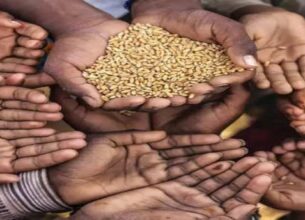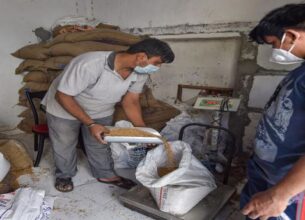Pradhan Mantri Garib Kalyan Ann Yojana Scheme (PMGKAY)
Why in News?
- The Central Government’s integrated food security scheme has been named as the Pradhan Mantri Garib Kalyan Ann Yojana (PMGKAY), under which free foodgrains are being given to more than 80 crore poor people from January 1.
What is PMGKAY?
- The new scheme has been named as Pradhan Mantri Garib Kalyan Ann Yojana (PMGKAY).
- Keeping in view welfare of the beneficiaries and in order to maintain uniformity across the states, free food grains will be provided under the PMGKAY for the year 2023 to the poor beneficiaries as per the entitlement under the the National Food Security Act (NFSA).
- Under the NFSA, the entitlement of food grains per person per month is 5 kg for priority households category, while 35 kg per family per month for Antodaya Anna Yojna (AAY) families.
- Till December 2022, the NFSA beneficiaries were getting their food grains entitlement at a highly subsidised rate of ₹1, ₹2 and ₹3 per kg for coarse cereals, wheat and rice, respectively. Now, they will get it for free this year.
- According to the ministry, necessary steps have already been taken for smooth implementation of the PMGKAY in the field. The ministry and state-run Food Corporation of India (FCI) officials are regularly interacting with state government officers for smooth roll out of the new scheme.
- The Central Government will spend more than ₹2 lakh crore in 2023 as food subsidy under the NFSA and other welfare schemes to remove the financial burden of the poor.
Were all poor people covered under the scheme?
- The scheme only provided grain for those families who held ration cards.
- During the first lockdown, the plight of migrant workers who held cards registered in their home villages but were stranded without food or employment in the cities where they worked, came to the limelight.
- A number of other poor families did not possess ration cards at all for a variety of reasons, including the state quotas on the number of ration cards.
- In May and June 2020, the Centre allocated 8 lakh tonnes of foodgrain to be distributed by States under the Atma Nirbhar Bharat scheme for stranded migrants and others without ration cards, although only 40% had been distributed even by August. The scheme was not revived during the second lockdown.
- The 80 crore cap on NFSA beneficiaries and state ration card quotas are based on 2011 census data.
- Given the projected increase in population since then, economists have estimated that 10 crore eligible people are being excluded from the NFSA’s safety net.
- In its June 2021 judgement in a suo moto case on the plight of migrant workers, the Supreme Court directed that the Centre and State should continue providing foodgrains to migrants whether or not they had ration cards.
What are the arguments for and against extension of PMGKAY?
- As the economy is also reviving and the OMSS [or open market sale scheme] is also exceptionally good, there is no proposal from the department for extension.
- It was previously noted that States are free to buy rice and wheat under OMSS, and distribute it to migrants and other vulnerable communities.
- The Right to Food Campaign, pointing to the SC judgement and noting that the pandemic still exists, unemployment remains at record levels and there is widespread hunger among vulnerable communities.
- They argued that the government should not only extend PMGKAY for another six months, but also universalise the public distribution system itself, so that anyone in need would receive food support regardless of whether they possessed a ration card or not.
- They also suggested that pulses and cooking oils be added to the monthly entitlements, given the recent rise in prices of these commodities.








